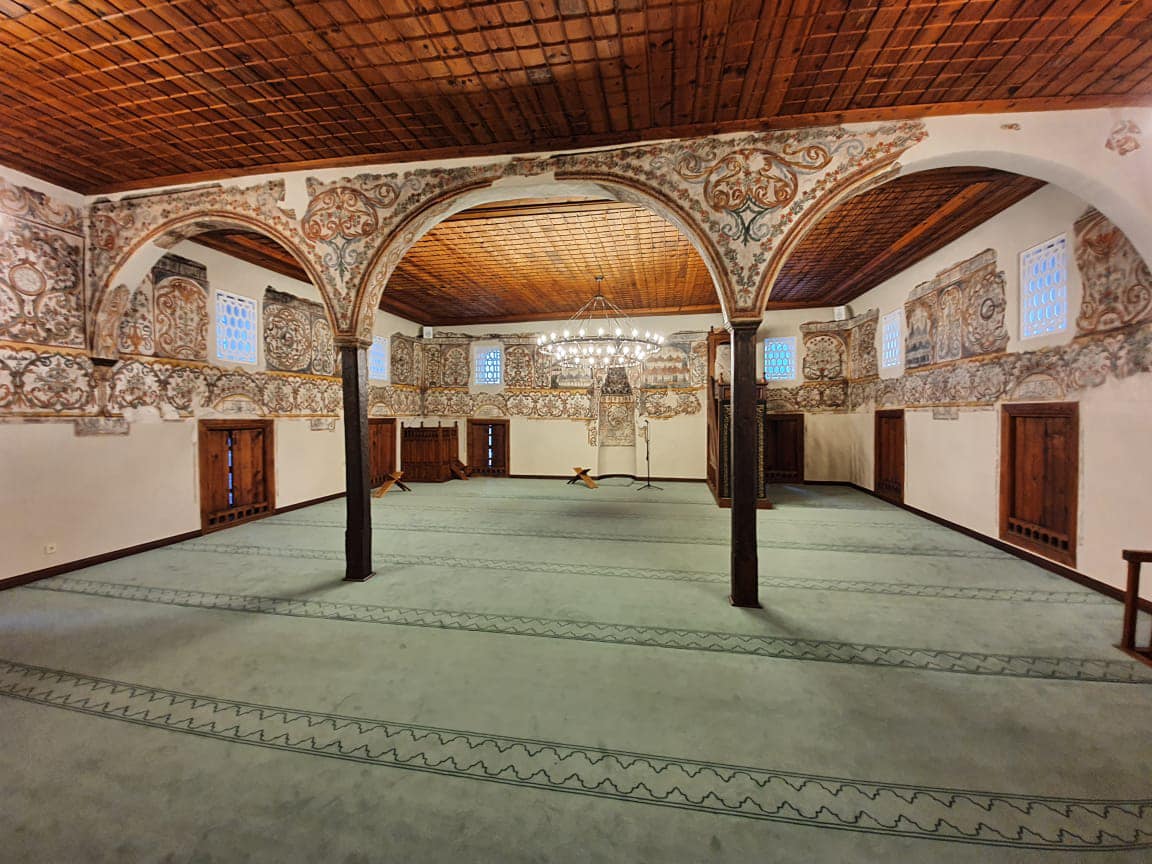Article by Wander-Lush The very best things to do in Berat Albania, including Berat Castle and a day trip to Osumi Canyon, plus instructions for how to travel from Tirana to Berat by bus.
Berat in central Albania is an elegant stone-and-alabaster city wreathed in fig trees and cleaved by the Osumi River.
An ancient Illyrian settlement turned Byzantine frontier town, Berat is known for the Ottoman houses that cascade down both sides of its gentle river valley. Evenly spaced portals cut into the stone facades lend it the famous epithet: ‘The City of a Thousand Windows’.
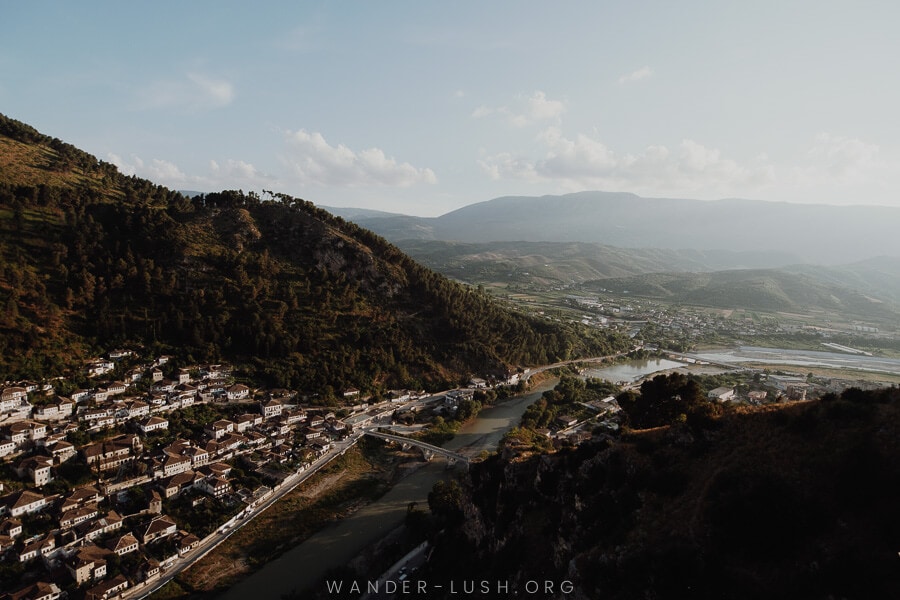
Berat is home to one of two UNESCO-listed historic centers (the other being in Gjirokaster), making it a must-see in Albania for history buffs and culture lovers alike.
Between the unusual Berat Kala and the medieval bazaar, historic mosques, local cuisine, a lively cafe scene, and one of the most handsome Ethnographic Museums in the Balkans, Berat has a lot to offer. Not to mention the spectacular valleys, canyons, and wineries within easy reach of the city.
There are so many reasons to add a few days in Berat to your Albania itinerary.
I have visited Berat twice now: Once in 2019, and again this past autumn during my mega Albanian road trip. Though it has become busier and more built-up, Berat retains its charm and remains one of my favourite small cities in the Balkans.
Here is my complete guide to Berat, plus my Berat trip resources and transport tips.
Please note: This post contains affiliate links, meaning I may earn a commission if you purchase by clicking a link (at no extra cost to you). Learn more.

How to get to Berat
BUS FROM TIRANA TO BERAT
Minibusses (33-seaters) bound for Berat depart regularly from Tirana’s South and North Bus Terminal (see the exact location on Google Maps). According to the timetable, buses leave every hour or so between 5.40 am and 5.30 pm.
Travel time to Berat is approximately 2 hours and 15 minutes. All buses seem to go via Durres, which adds extra time to the journey. The highway from Durres to Berat is fantastic – smooth and straight the whole way.
The bus fare is 500 LEK per person. Purchase tickets from the steward on board the bus.
When you arrive in Berat, the bus terminates at the Berat Bus Terminal located 3 kilometers from the Old Town (see the location on Google Maps). From the bus station, you can either jump on a green city bus that will take you to the center (30 LEK per person), or take a taxi directly to your accommodation (we were quoted 500 LEK for the trip).
Berat can be reached by bus from other cities around Albania – check routes, schedules, and fares here on the Gjirafa website.
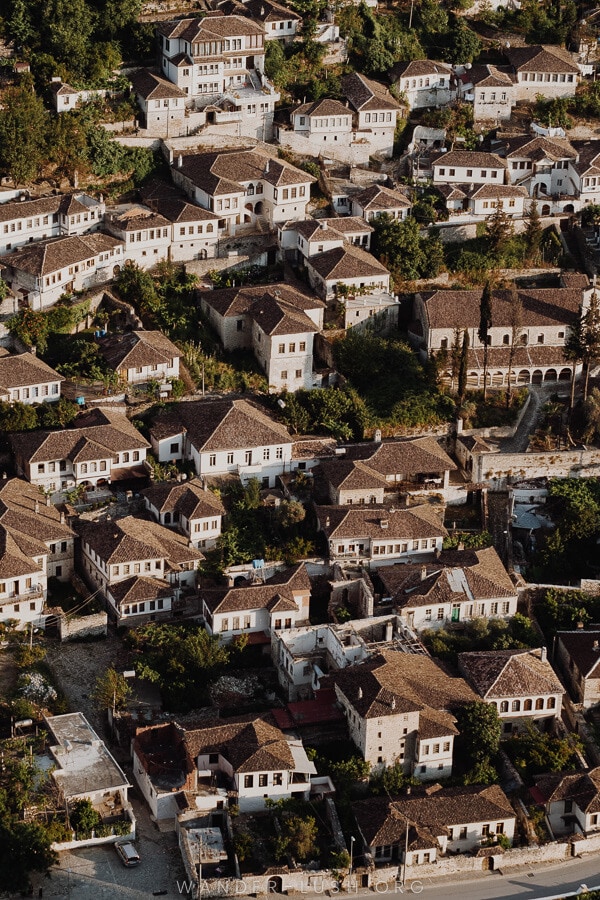
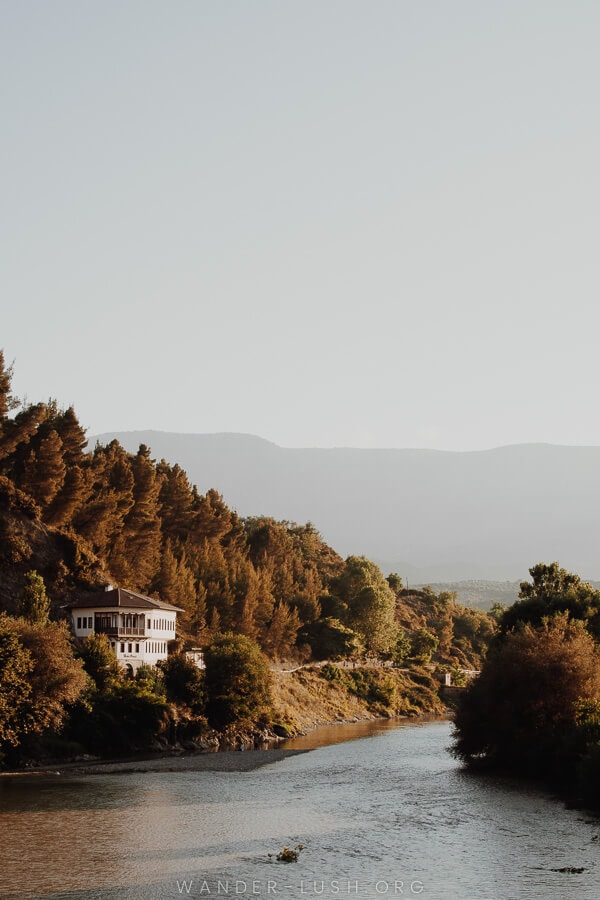
DRIVING TO BERAT
On our second trip to Albania, we drove ourselves to Berat from Tirana. The journey via State Highway 3 takes under two hours. The highway is in perfect condition and very easy to navigate.
When you arrive in Berat, if you are headed straight for the castle, be sure to make a left at the roundabout after the bus station and approach the castle from the north. The other road (on the southern side) is steep and narrow – best to avoid it.
If you are staying inside the castle at Josiph B&B, note that you are allowed to drive into the castle. Ample free parking is available inside. Just note the driving directions and if in doubt, stop and ask someone – don’t make the same mistake we did and try to brute force your way down one of the tight alleyways!
I recommend hiring a car in Tirana through Local Rent and choosing the city pick-up option so you can get straight on the highway.
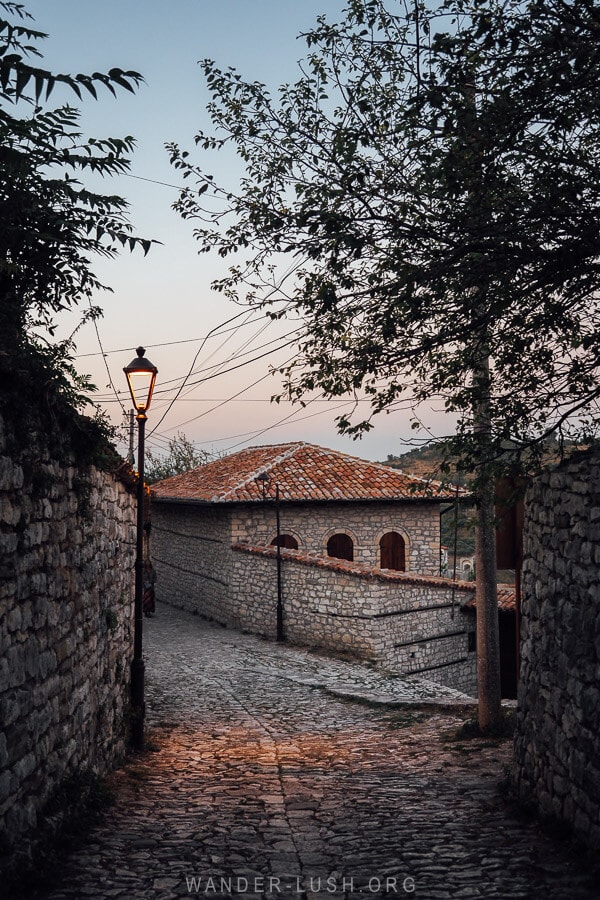
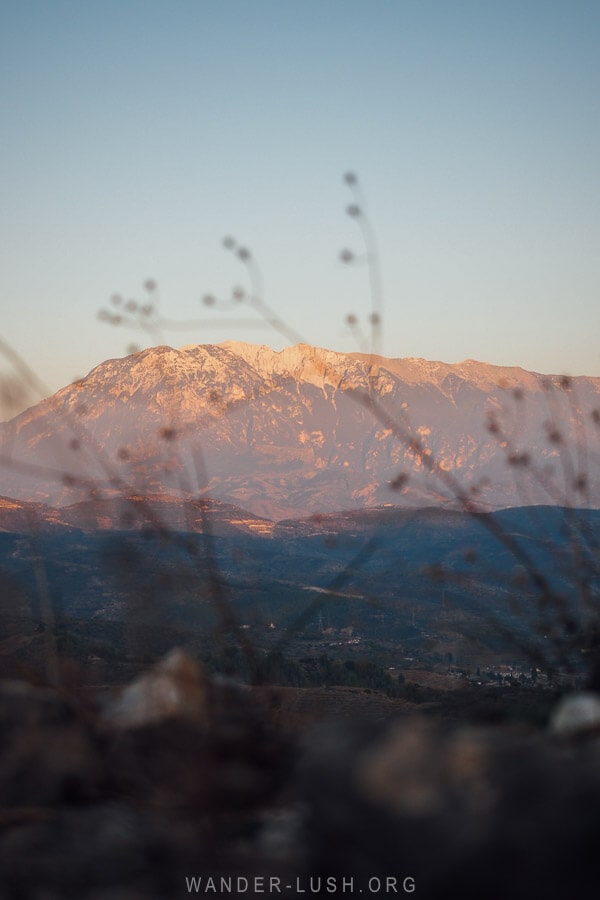
How long to spend in Berat
We stayed in Berat for 3 nights the first time around and 2 nights on our return visit. If you want to take your time with the city and get out into nature, two full days plus an extra evening is the perfect amount of time to spend in Berat.
Berat is compact. It is possible to see the highlights of the historic Old Town plus the castle in a day. I highly recommend staying at least one night so you can catch the sunset and see Berat lit up after dark. Wandering the castle grounds in the evening is a true joy.
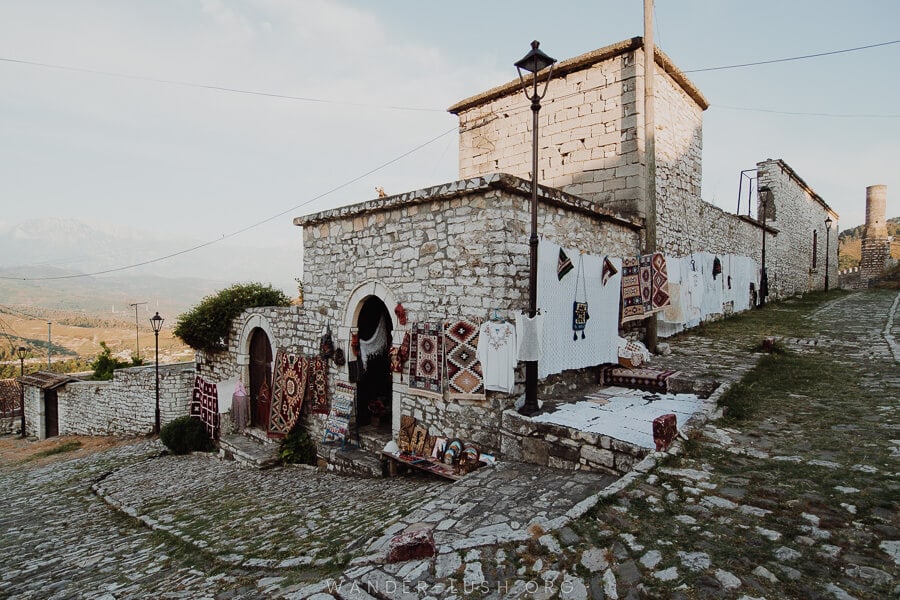
Where to stay in Berat
Bed & Breakfast Joseph (my top choice) – On our return trip to Berat, we wanted to stay inside the castle walls. Josiph’s family home is very simple, but guest rooms are warm, comfortable, and clean. Being able to easily explore the castle in the early morning and late afternoon (without having to climb up and down the hill) is the best thing about staying here. Josiph’s lovely wife serves a delicious local breakfast on the terrace overlooking the rooftops.
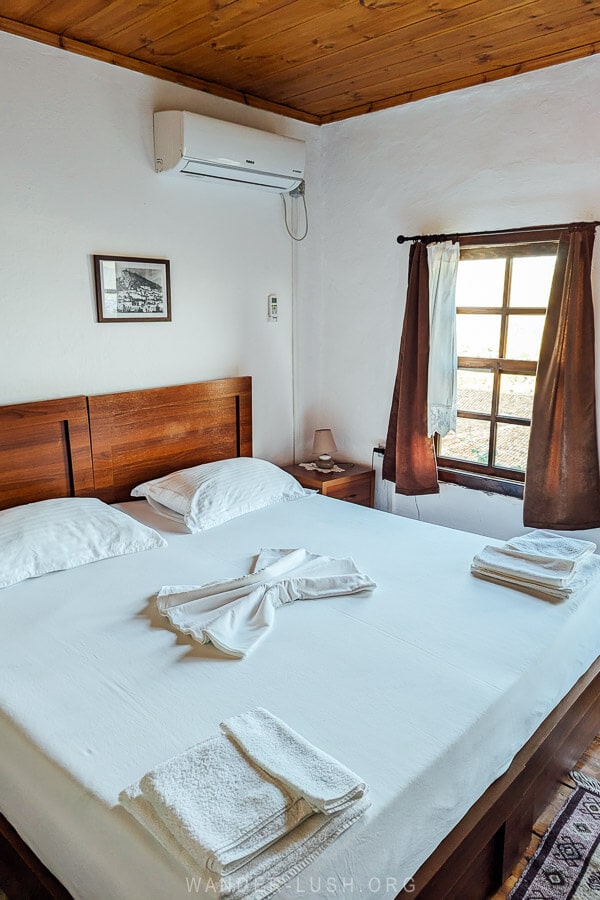
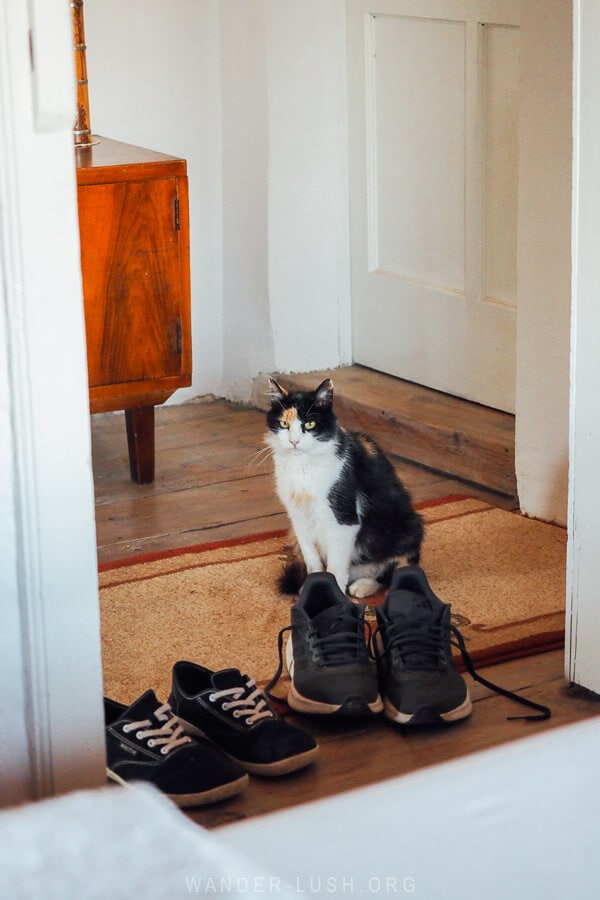
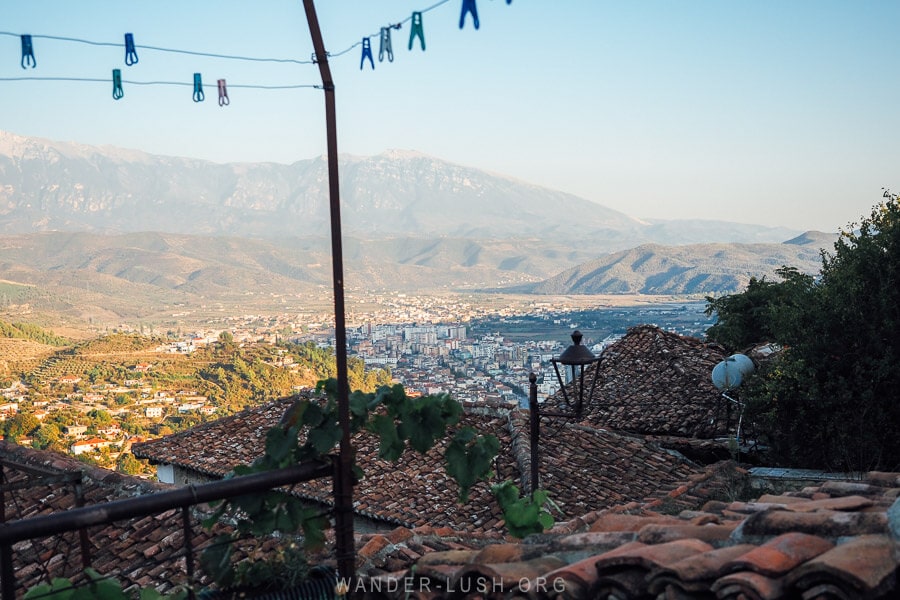
Tradita e Beratit (boutique) – Set in a traditional house in the Gorica Quarter, this hotel combines old-world charm and mod-cons for one of the best accommodation experiences in Berat.
Guesthouse Arben Elezi (mid-range) – This guesthouse has well-appointed rooms and a massive rooftop terrace with gorgeous views of Berat city. Breakfast comes included. This is where Ross’s parents stayed on our first trip to Berat – needless to say, we spent a decent amount of time mooching around on their terrace!
Ana Rest House Hostel (budget) – This popular hostel offers private twin and family rooms as well as a six-dorm bunk. The location on a quiet street in Gorica Quarter is a bit of a walk from the castle, but great for accessing restaurants and bars in the new town.
12 best things to do in Berat, Albania
Here are the best things to do in Berat, plus a few suggested day trips. At the end of the list, you’ll find a free map to help you find your way around.
1. EXPLORE BERAT CASTLE
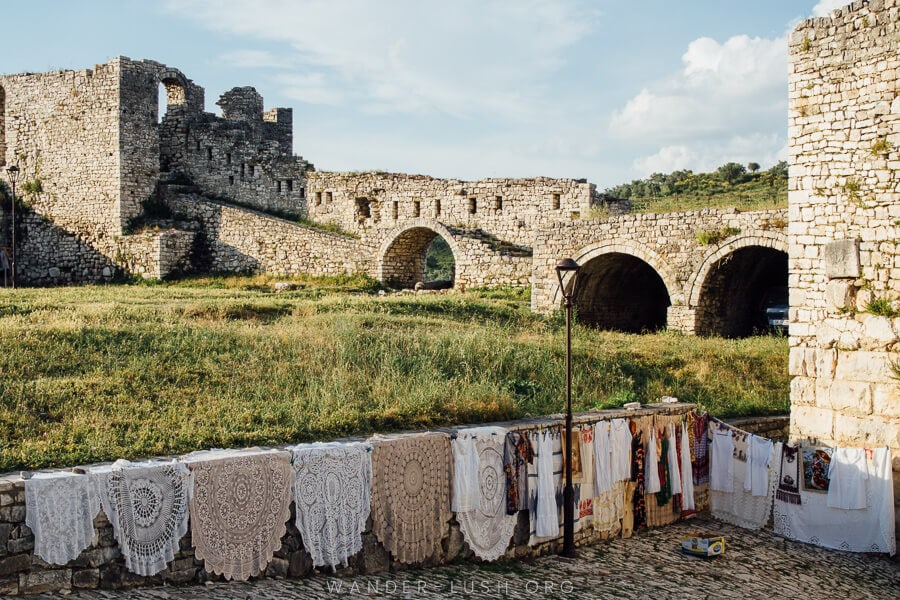
The long brushstroke of chestnut-colored rooftops that make up Berat’s historic center is painted through the Osum River valley. Twin peaks rise on either side. Gorica Hill, the taller of the two, wears a stony crown: The formidable 13th century Berat Castle.
Berat Castle is one of the biggest fortifications in Albania. Unlike other castles in the region that have been hollowed out over time, Berat Castle is mostly intact. Within its walls, you’ll find a vast citadel complex of stone streets, houses, and Byzantine churches mixed in with ruins from various epochs.
Having visited dozens of fortresses in Albania and across the Balkans, Berat Castle feels unique.
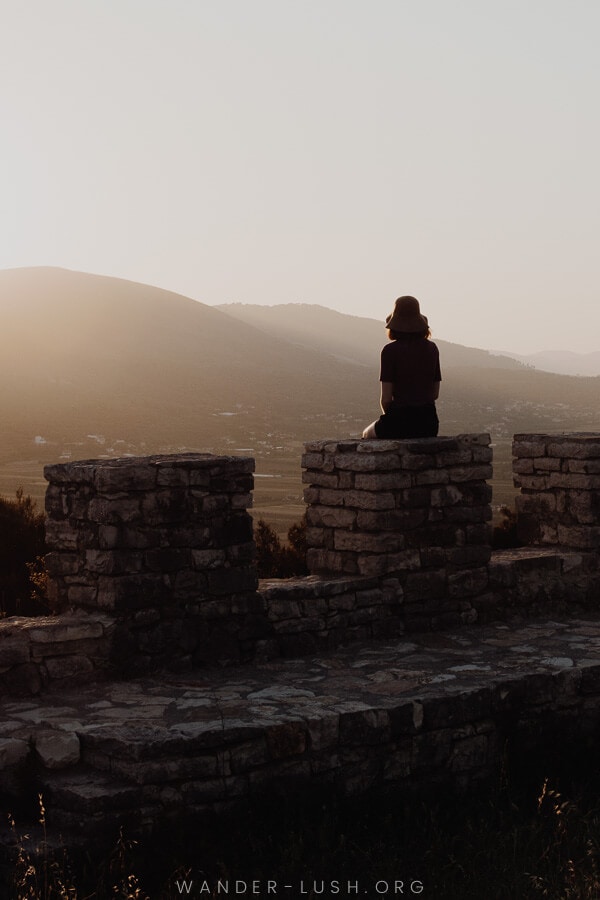
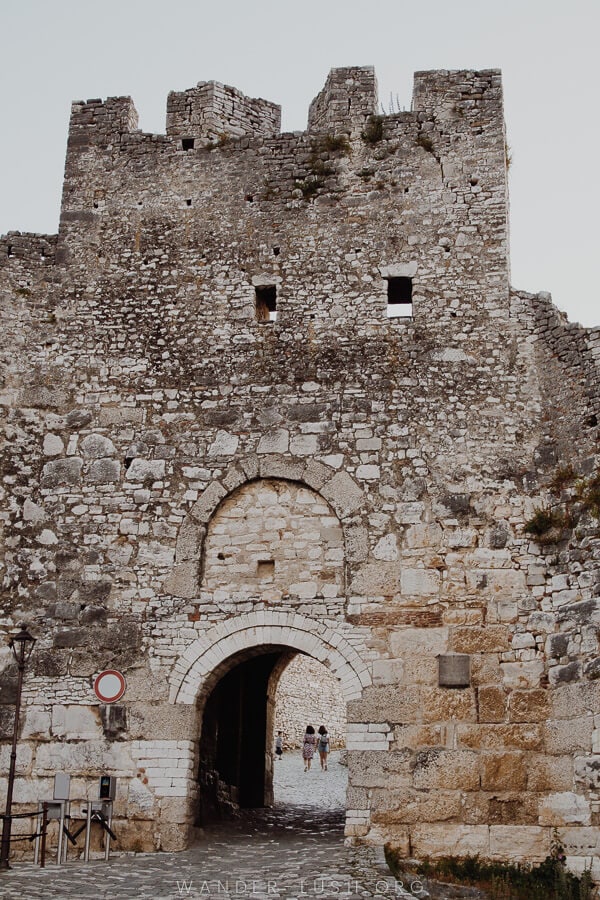
The area is also referred to as the ‘Castle Quarter’ because many families (including our dear host Josiph’s) still dwell inside the citadel walls. Some homes have been converted into guesthouses, restaurants, or souvenir shops. Others remain in private residences.
As you wander around, it’s not unusual to see men herding sheep, kids kicking soccer balls and women selling lace and embroidered tablecloths from little stalls set in front of their homes.
Berat Castle isn’t a relic – it still has a heartbeat. One of the nicest things to do in Berat is join locals in their evening stroll through the cobbled laneways.
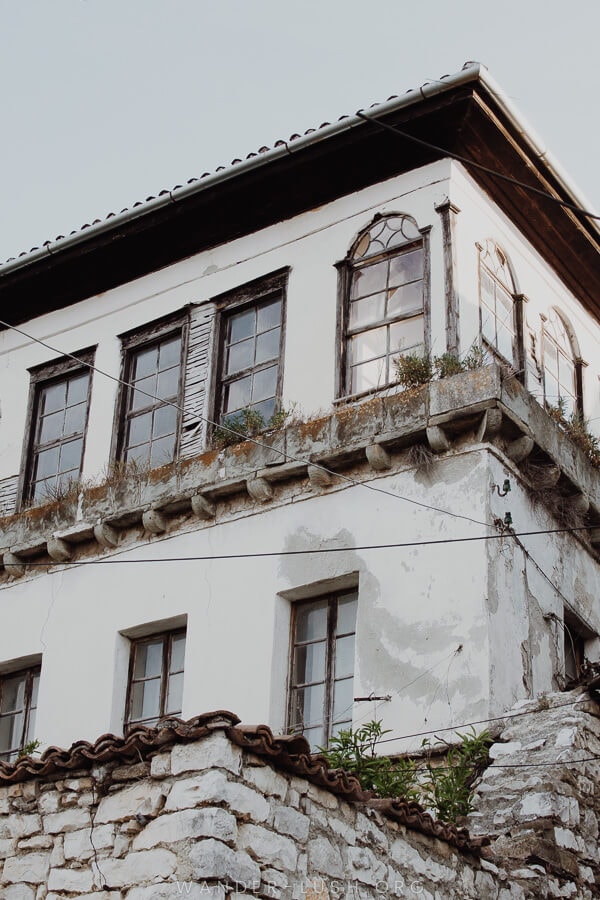
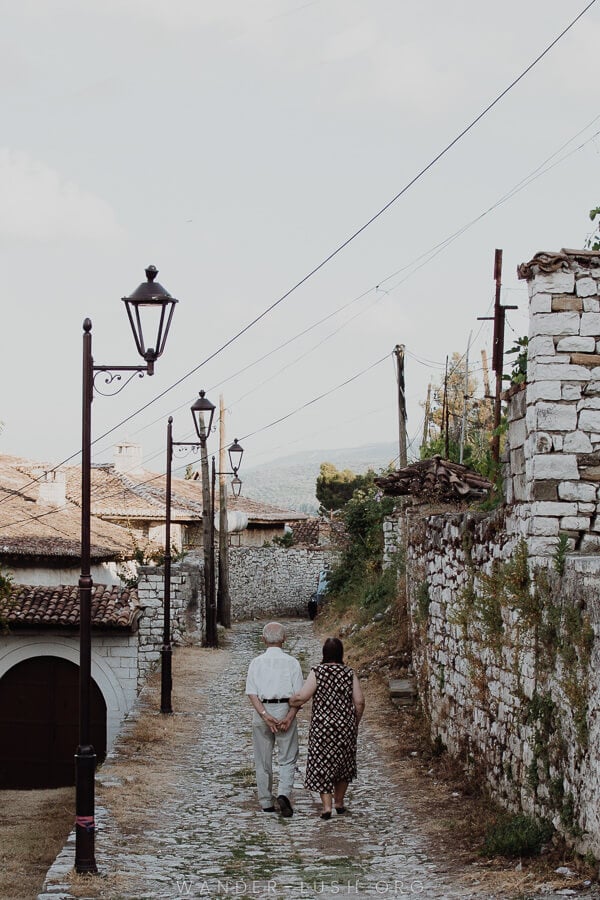
Apart from the walls and ramparts themselves, key points of interest within Berat Castle include the 13th-century St. Mary of Blachernae Church with its original frescoes (more on that below), the ruins of two mosques, and the remnants of an old acropolis including a subterranean water cistern.
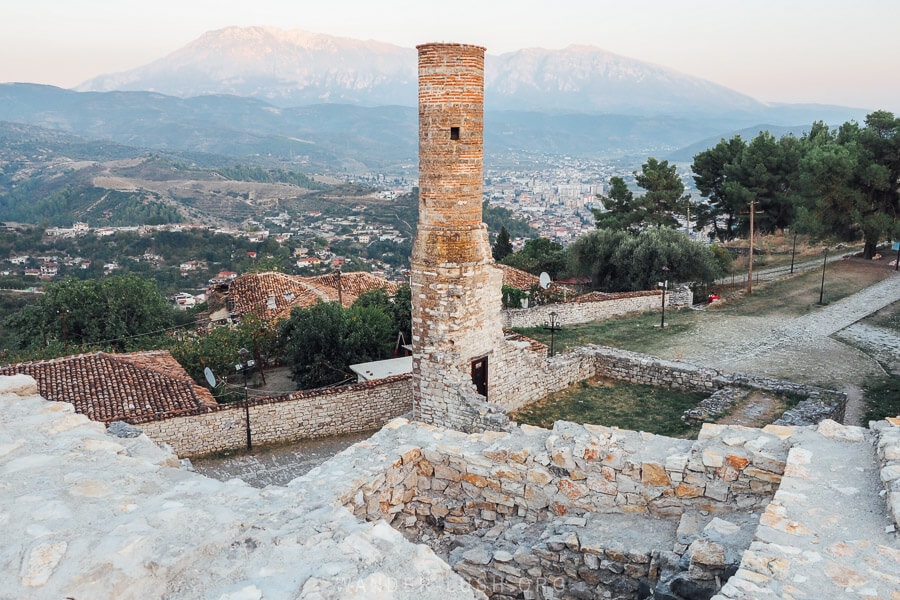
Be on the lookout for the head of Constantine the Great.
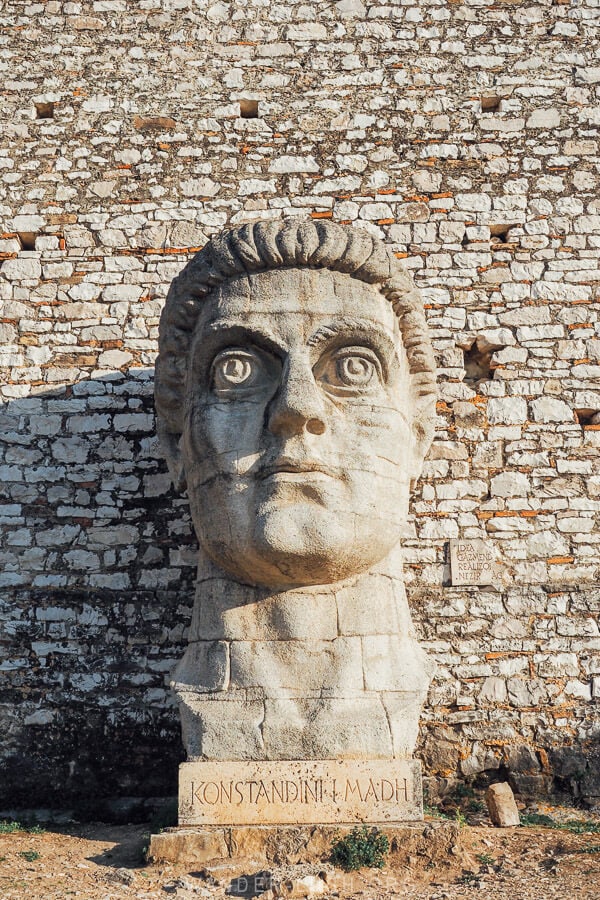

Perched on a hillside above the old wall, the 14th-century Holy Trinity Church (Kisha Shen Triadha) is one of the most iconic landmarks inside the castle grounds.
Whoever designed this church was both inspired and resourceful: The architecture combines Byzantine and Western elements, and inside, several of the column capitals are repurposed from old ruins.

A designated viewing platform with a newly built ramp offers the best panoramic views over Berat, but you can find nice aspects from just about anywhere – including an epic sunset vista from the top of the White Mosque.

Berat Castle is open 24 hours and is completely free to visit.
It takes a long, steep climb up a slick stone road to reach the castle from the lower town. If you are not staying inside the castle, then I recommend you head up first thing in the morning or wait until late afternoon.
You need a minimum of two hours to explore the interior of the castle properly, plus another 60-90 minutes for the museum (more below). There are several restaurants and bars inside the castle. Keep reading for my top picks.
2. ADMIRE THE RELICS AT THE NATIONAL ICONOGRAPHIC MUSEUM
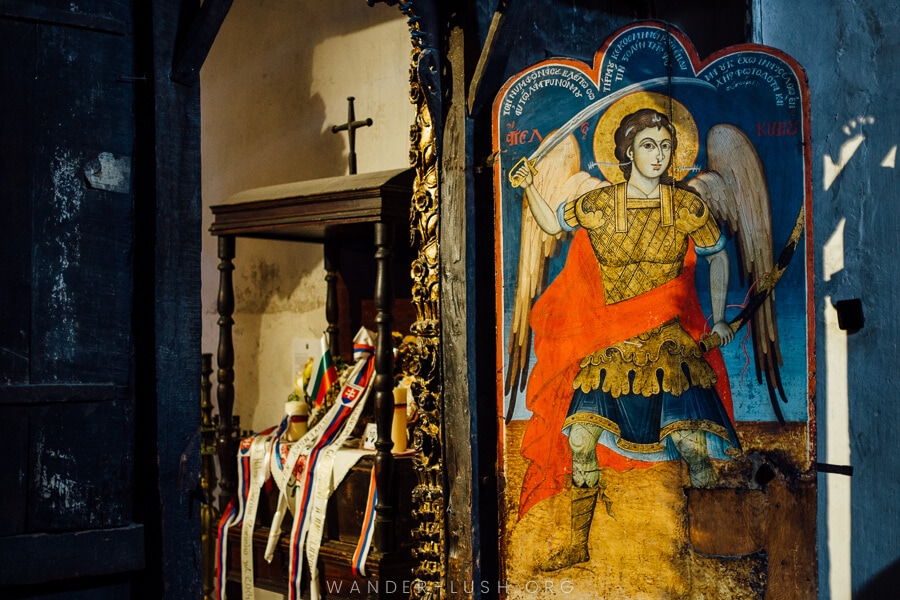
The Onufri National Iconographic Museum (Muzeu Kombëtar Ikonografik Onufri) was established to safeguard a collection of 200-plus icons and artifacts salvaged from the ruins of churches in Berat and further afield. Rivaled only by the National Museum of Medieval Art in Korca, it represents one of Albania’s most important collections of ecclesiastical art
If you’re going to visit just one museum to visit in Berat, make it this one. It offers a window into a unique and very beautiful aspect of Albanian culture – and even if you’re not particularly interested in religion or religious art, you will still find the collection impressive.
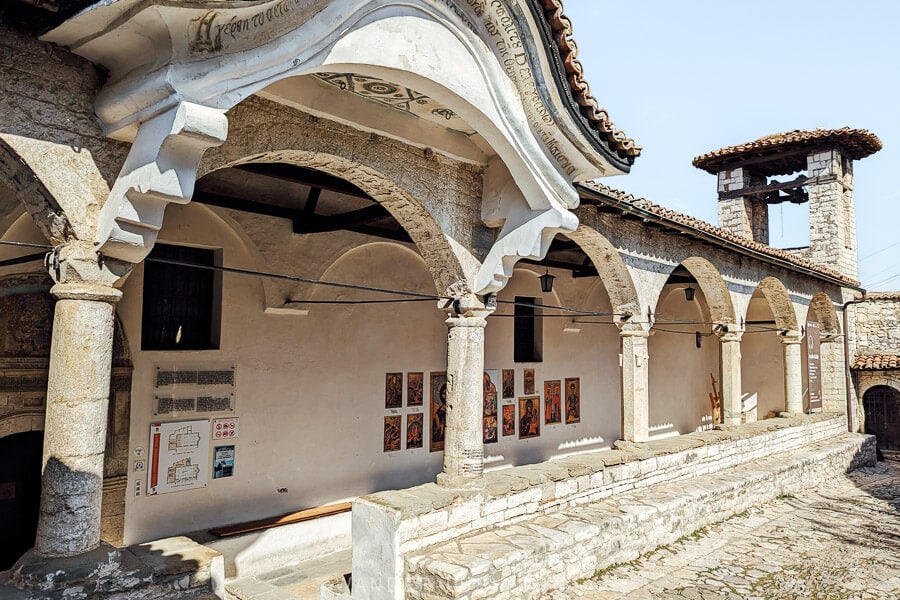
Located inside the castle walls, the Onufri Museum is housed in the Church of the Dormition of St. Mary, a triple-nave Byzantine basilica dated 1797.
The first section of the museum is set inside the partially restored church. The incredible iconostasis showcases Albanian silversmithing and woodcarving.
The second part of the museum is arranged gallery-style. Some of the region’s most important icon painters are represented in the collection, including the master Onufri, whose school was established here in Berat and extended its influence across Albania and as far afield as Kastoria in northern Greece.
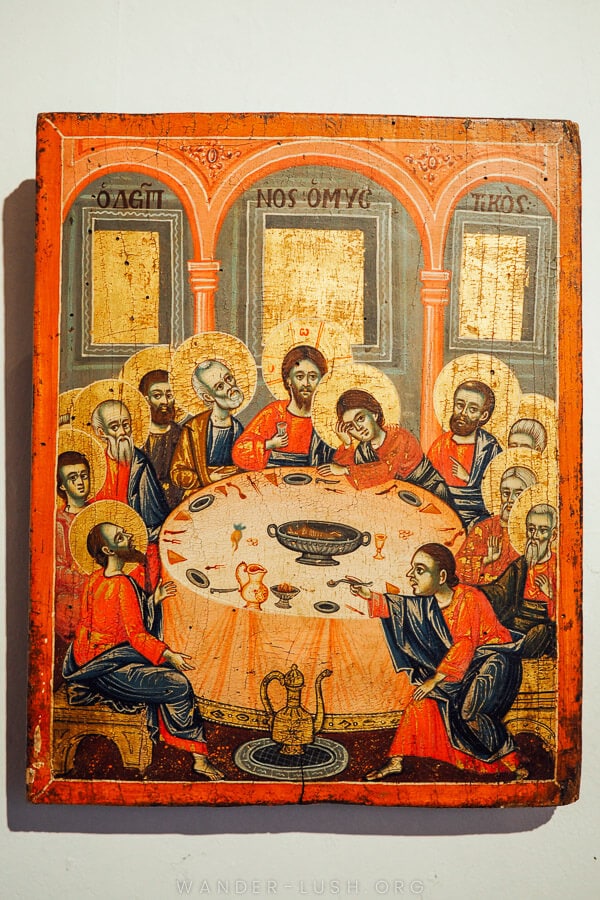
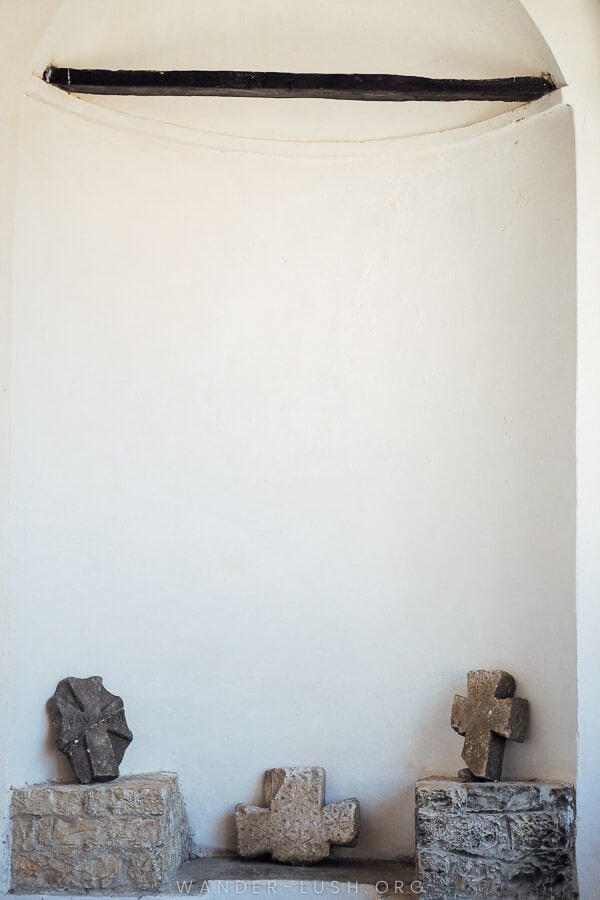
The Onufri National Iconographic Museum is open Tuesday to Saturday from 9 am-4 pm and Sunday from 9 am-2 pm (closed Mondays). Entrance costs 400 LEK per person.
For an additional 100 LEK, you can hire an audio guide. The narrated walk-through takes around 90 minutes and despite some of the exhibit numbers being out of order, it is very much worthwhile. Note that signage inside the museum is limited.
Free (optional) lockers are available at the museum entrance if you want to lighten the load.
3. GO INSIDE ONE OF BERAT’S BYZANTINE CHURCHES
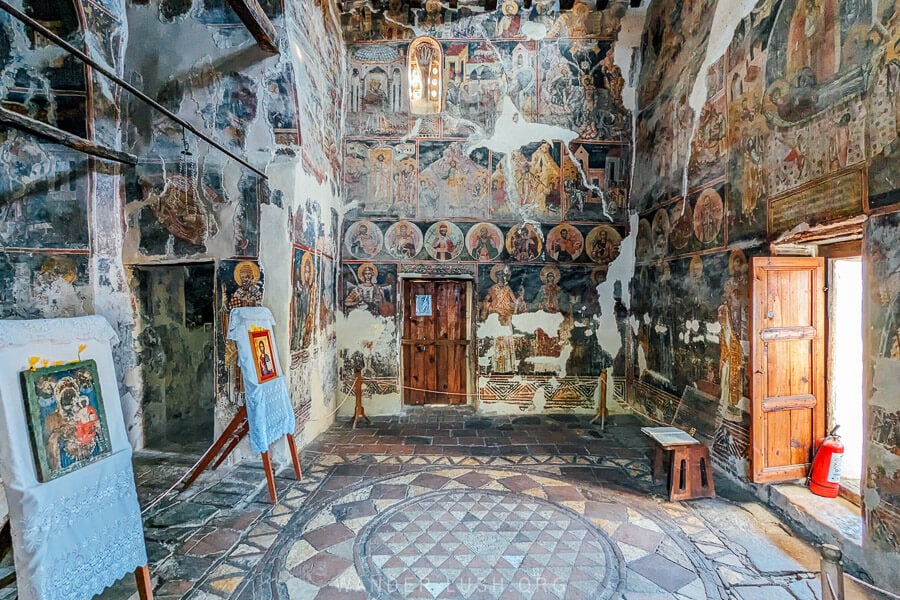
On my first visit to Berat, I completely missed out on seeing the Byzantine churches. Despite reading all about them at the Onufri Museum, I had no idea that some were still standing – and moreover, that they are open to the public.
Believe it or not, we stumbled on the churches completely by accident when searching for the Constantine the Great sculpture on our last evening in the city.

Hearing music playing, we followed our ears up to St Mary of Blachernae (Kisha e Shën Mëri Vllahernës). Said to be the oldest church in Berat, it dates to the 13th century. Most of the original 16th-century frescoes (some painted by Onufri’s son, Nicholas, in 1578) remain intact, making this a priceless opportunity to see some of Berat’s finest iconography in situ.
This church is open from 9 am until 6 pm daily. The caretakers are in the habit of asking tourists for a donation, but note that it is not mandatory to pay.
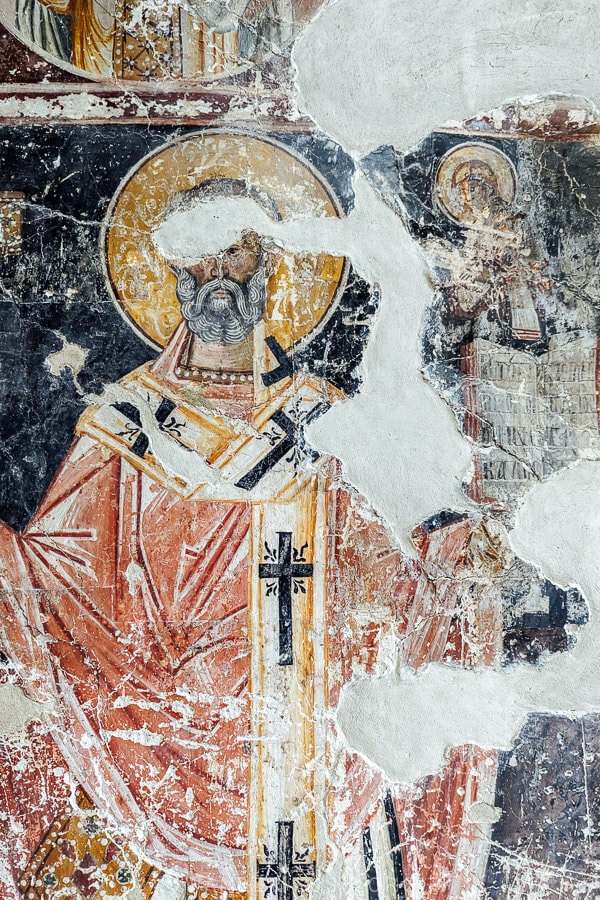
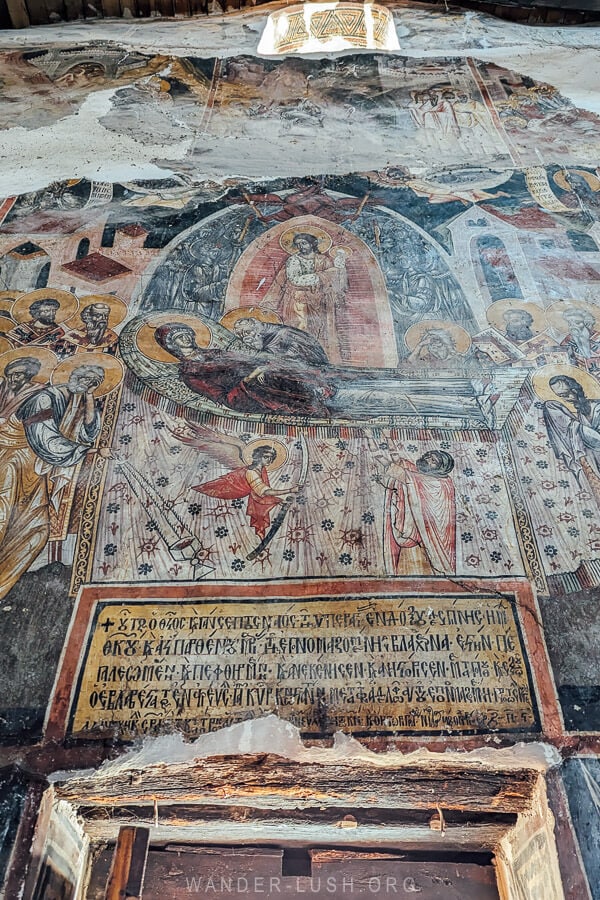
Nearby, we were also able to go inside the 16th-century Church of St Nicholas (Kisha e Shën Kollit), which is adorned with frescoes by Onufer Qiprioti, and the 17th-century Church of Saint Constantine and Helen (Kisha e Shën Kostandinit dhe Elenës).
4. EXPLORE THE HISTORIC MANGALEM QUARTER
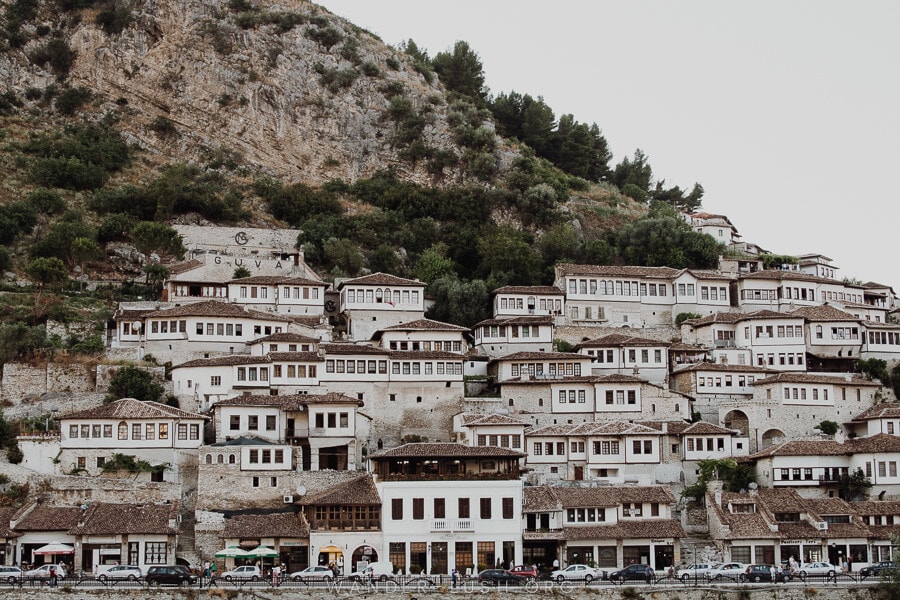
The river valley that runs through Berat dissects the city into two precincts: Mangalem (Mangalemi) and Gorica. There’s not any meaningful difference between the two today – but in centuries past, Mangalem was traditionally the Ottoman or Muslim Quarter, with Christians living over the river in Gorica. Together they make up Berat Old Town.
Mangalem, the larger of the two neighborhoods, fans out under the castle’s wing. Houses inch up the hillside like creeping vines drawn towards the sun, all vying for a precious slice of that priceless Berat view.
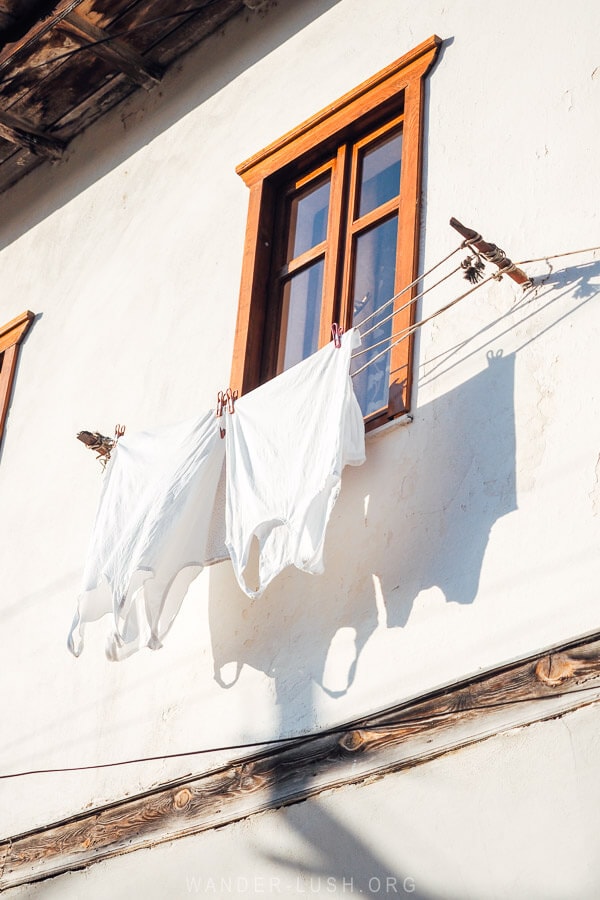

Spiralling stone alleys and narrow streets link impressive Ottoman-style houses. Halveti Tekke, Berat’s Dervish House built in 1782 by Ahmet Kurt Pasha, the Gate of the Pasha (below right), the recently restored Leaden Mosque and the 1820s Bachelor’s Mosque (below left) are all located along Mangalem’s historic alleys.


As the story goes, the latter is named after two young Berati men who went off to work in Istanbul and then gifted their hometown this beautiful religious building with the money they earned.
5. CLIMB UP TO THE CLIFFSIDE ST MICHAEL’S CHURCH

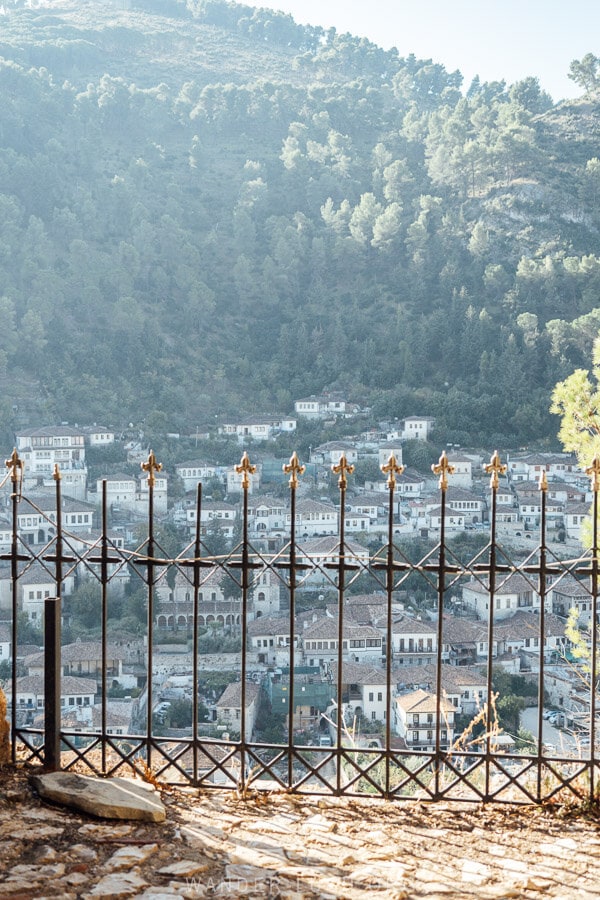
For a nice view of the Gorica Quarter, take a short hike up to St Michael’s Church. The church is embedded in the cliffside so the way there is quite steep and uneven. The views of Gorica and its houses are quite impressive. Just don’t go in the early morning like we did – the sun is too bright.
The church itself is modest, with a pretty iconostasis. What was more interesting to me were the grottoes outside the church where believers have set up icons and votive candles.
Unfortunately our experience was soured by the caretaker who demanded money from us to enter the church. We were more than happy to leave a donation, but he insisted we put money in his hand rather than in the marked box – and that didn’t sit well with us. We simply ignored him and put our coins in the box anyway.
The path up to St Michael’s Church is a bit tricky to find. You cannot access it from the castle, only from the riverside. Start by following the main street along the river towards Gorica Bridge, then make a right up the stairs before LUNDRA Fast Food. Pass by Timo’s Guest House and keep following the alleyway/stairs, which eventually turns into a dirt track.
The church is only open in the morning – however you can still access the area after 1pm. Follow any of the loose gravel paths for a spectacular view.
6. CROSS THE RIVER TO GORICA QUARTER & CLIMB GORICA HILL

Mangalem and Gorica are linked together by Gorica Bridge, a seven-arched stone bridge with a similar design to the Ottoman bridge in Visegrad in Bosnia and Herzegovina.
Over in Gorica Quarter, the architecture is just as beguiling and the narrow alleys equally precipitous. Many of the 18th century homes have been designated cultural landmarks and are signposted with information boards.
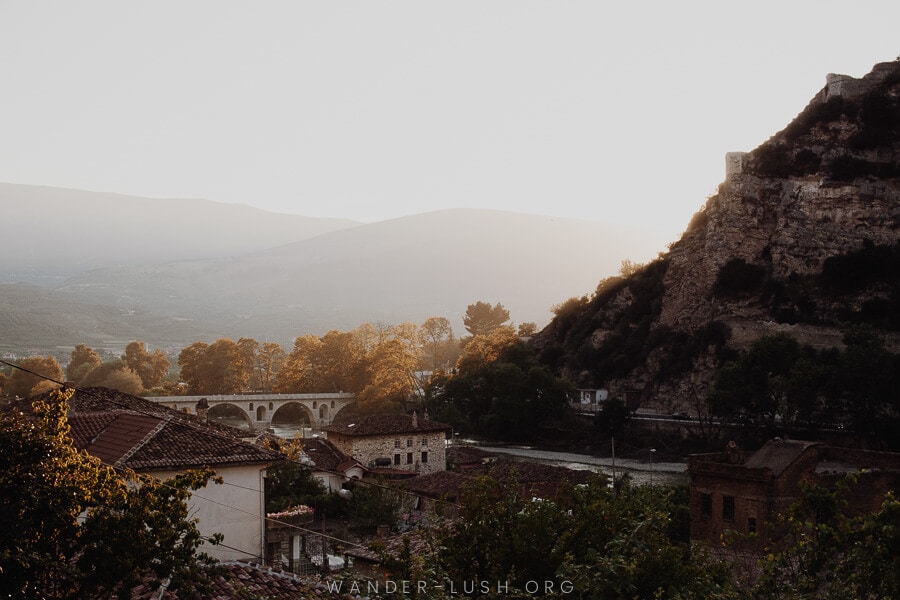
Clamber up the sloping cobblestoned streets on the left bank of the river behind Hotel Muzaka to find your way to the top of Gorica Hill.
On the way up, you get stunning views of Mangalem’s white houses front-on, with Berat Castle silhouetted against the distant mountains.
7. VISIT THE ETHNOGRAPHIC MUSEUM

Back over the river, Mangalem hosts Berat’s Ethnographic Museum, one of the grandest Ottoman-era houses in the city. We’ve visited a dozen of these house museums in the Balkans: Berat’s is the biggest and one of the most remarkable we’ve seen thus far.
As is customary, the house is set up as it would have been when it was first built. Interestingly you can also see the bathroom here (most house museums have this part of the property closed off).
Entrance costs 300 LEK, and the museum observes the same hours as the Onufri Museum.
Important note: At the time of writing, the Ethnographic Museum is temporarily closed.
8. RECEIVE A LOCAL WELCOME AT SOLIDARITY SHOP
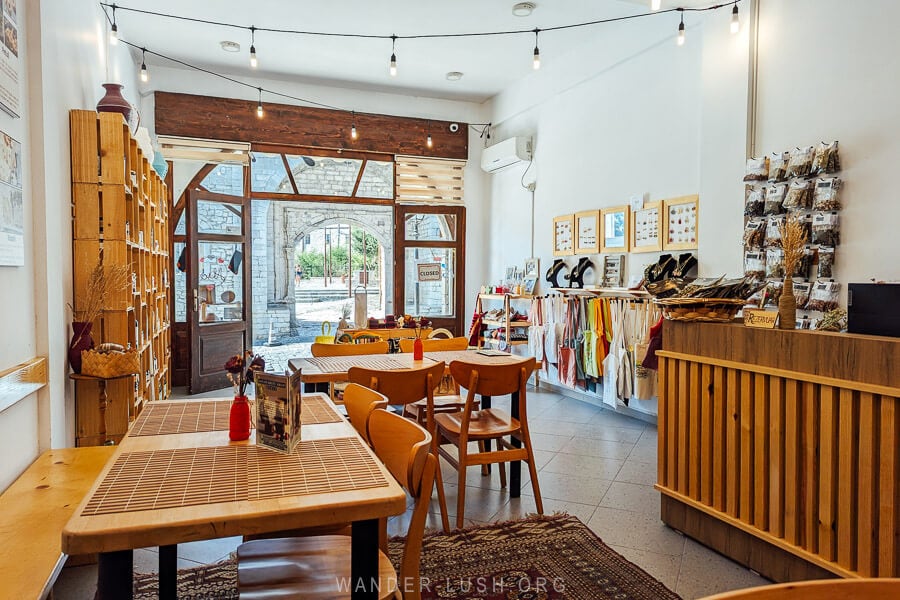
Located at the foot of the castle opposite the Gate of the Pasha, Solidarity Shop Berat is a social enterprise where you can buy local agricultural products (olive oil, tea, gliko fruit preserves, etc.) and handmade souvenirs.
The shop has a small cafe space where you can try a pot of mountain tea, a glass of Albanian wine, a charcuterie board, or a selection of traditional Berati desserts.

Solidary Shop also offers a cute ‘Welcoming’ menu that showcases local flavours. Despite arriving before 11am, we opted for ‘The Local Way’ (pictured above): Seasonal gliko, a shot of raki, a piece of suxhuk (a locum or Turkish delight-like sweet) and a Turkish coffee, to be consumed in precisely that order!
9. ENJOY A SUNDOWNER AT TE ZALUA INSIDE THE CASTLE


Te Zalua has the best views of any restaurant bar in Berat. You should arrive well before sunset if you want to snag one of the tables set right out on the precipice. From this vantage, you get uninterrupted views of the new city below.Local beer and traditional dishes are reasonably priced. Find Te Zalua close to the marked viewing platform, at the southern end of the castle grounds.
10. GO FOR AN EVENING XHIRO ON BOULEVARD REPUBLIKA

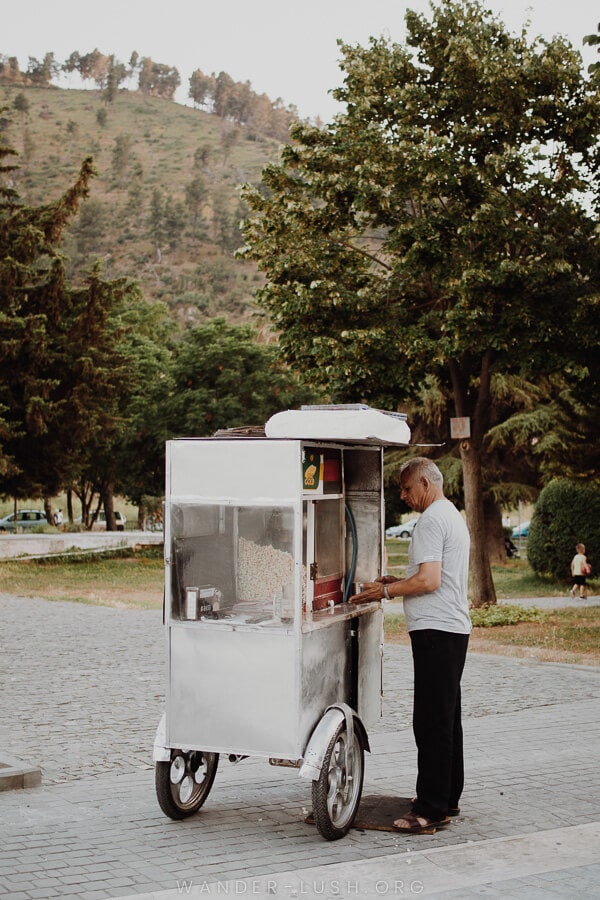
Xhiro is a tradition all over Albania. Come sunset, entire towns and cities empty out onto the nearest pedestrian street. People lap up and down for hours on end, stopping to chat with friends, play a game of outdoor chess, grab an ice cream or sip coffee in an outdoor cafe.
In Berat, Boulevard Republika is the most popular place for a xhiro. The huge car-free drag is lined with cafes on one side and Lulishtja, a green buffer that runs between the street and the river, on the other. If you want a local experience, strolling here on a crisp evening is one of the funniest things to do in Berat.
If you need a cool place to sit for a few hours, Gimi Kafe (one of the first cafes closest to the Old Town) has excellent air conditioning and WIFI.
11. TAKE A DAY TRIP TO OSUM CANYON & BOGOVE WATERFALL
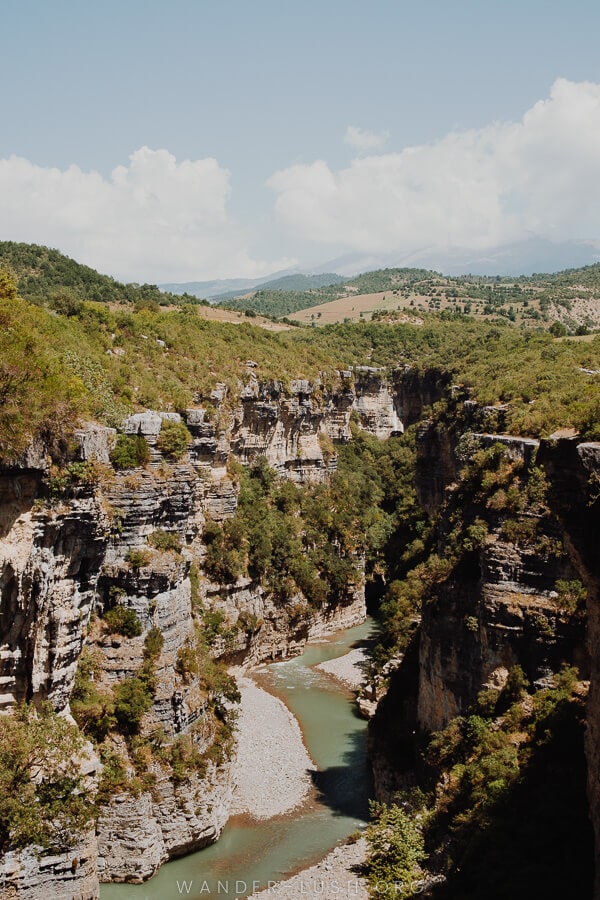
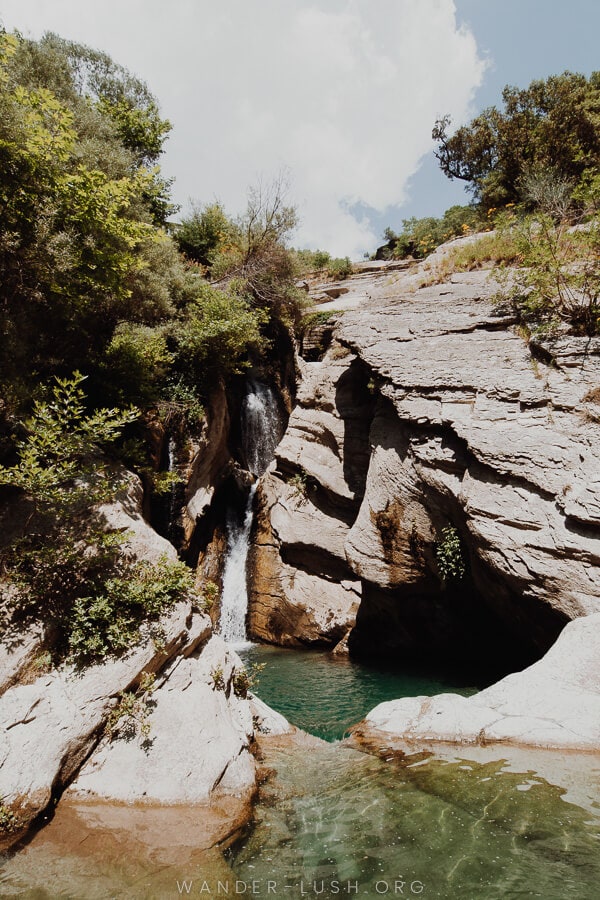
The landscape in this part of Albania is characterized by dramatic mountains and gorges. If you have some extra time and you’re itching to throw some outdoor activities into your itinerary, I highly recommend doing a combined day trip to Osum (Osumi) Canyon and Bogove Waterfall.
Bogove Waterfall is an hour south of Berat, just past the town of Pelican and its shuttered Kalashnikov factory. It requires a 40-minute walk to get down to the rock pools from the main road. The whole area is divine, green, and shady with deep swimming holes and cascading falls. Just be wary that the water is numbingly cold, even in summer!
Osumi River Gorge, Albania’s largest canyon, is further downriver, another 30 minutes south of Bogove via the same treacherous road. A series of viewpoints around the rim of the gorge offer spectacular views. There are a few spots where you can drive down and have a swim in the warm river. In spring, you can also do white water rafting through the ravine.
You need a proper off-road vehicle and a guide to do this day trip justice. Berat city tours in town organize excursions to Osumi Canyon and Bogove.
For something even more active, this guided 18 km hike through the canyon includes transfers to and from Berat.
12. DO A WINE TASTING AT COBO WINERY
Wine… In Albania!? Believe it or not, Albania is one of the most underrated wine countries in Europe and there are vineyards all over the country. Cobo Winery, the closest to Berat, is a short 20-minute drive from the Old Town. So if you’re looking for more fun activities nearby, a degustation here might be just the ticket.
A visit includes a tour of the property, cellars, and vines, plus a tasting of the finest wines and walnut raki accompanied by a decadent cheese board.
Ariana, the owner’s daughter, speaks English and is on hand to show guests around. It’s recommended to call or message a day or two in advance if you want to visit independently.
Where to eat in Berat: The best Berat restaurants, bars & cafes
If you’ve been travelling around the Balkans for a while, you’ll notice some immediate (and delicious) differences with Albanian food. Cevapi fatigue be gone! Albanian cuisine is a fresh and tasty alternative.
There are a few specialty dishes here in Berat that you won’t find elsewhere in the country – you should definitely go out of your way to try the local version of moussaka made with potato and Berat’s signature dessert, MonBlan meringue.
If you’re wondering where to eat in Berat, here are my top picks:
HOMEMADE FOOD LILI
This wildly popular restaurant serves delicious homespun and unpretentious food. Try the fergese, the pumpkin burek (seasonal), and the chicken cooked in yogurt. Homemade wine and raki is also served. It’s the hospitality that makes this place special – let’s just say Lili is not who you might be picturing!
There are only five tables, so it’s essential to book a spot at Homemade Food Lili a couple of days in advance. When we were there, we saw a dozen hopeful people get turned away.
HOTEL MANGALEMI RESTAURANT
The terrace here has some of the nicest views in Berat. You can see the entire city from up here – and taste the gamut of local food specialties.
Meals to try include homemade sausages, ‘Berati schnitzel’ (pork stuffed with hard cheese), pispili (spinach pie with a cornbread base), and of course leek pie. The white bean salad with pickles, parsley, and slices of fresh lemon is just the thing on a hot day.
If you’re looking for edible souvenirs (raki, jams, wildflower teas) to take home, there’s a nice gift shop in the Hotel Mangalemi lobby.

RESTAURANT WILDOR
This restaurant serves traditional fare in a lovely air-conditioned dining room. We ate grilled vegetables with balsamic, and a local Berati dish of pork cooked in a clay pot. It’s popular with tour groups so it’s a good idea to arrive early for lunch.
MBRICA RESTAURANT
Located inside the castle, this small family kitchen is another favorite eatery in Berat among tourists. The potato moussaka is delicious, as is the homemade baklava. We ate here twice on our recent trip to Berat.
Map of things to do in Berat
Click here to open the map on Google Maps.
What to pack for Albania
- A good quality backpack. The easiest way to get around Albania is with an anti-theft day pack and a large pack for your main luggage. Here are a few of my favourite minimalist backpack designs for inspiration.
- A scarf (women). A lightweight cotton scarf is my number one travel item. In Albania, it will come in extra handy for covering your hair when entering a mosque or Orthodox Cathedral. This neutral travel scarf goes with anything, and it even has a hidden pocket.
- Walking shoes. From the cobbled streets of Berat to the rocky peaks of the alps, comfy walking shoes are absolutely essential for Albania. I love these comfy sandals, and my partner lives in these waterproof shoes.
- A reusable water bottle. Avoid single-use plastics whenever you can. I love my S’Well water bottle for warm climates because it doesn’t sweat.
- Wine Wings. Should you decide to buy a drinkable souvenir in Albania, these handy custom-made bottle protectors will keep your vino safe and sound in your luggage. A travel corkscrew and a wine stopper are bound to come in handy, too.
- Entertainment for long bus/furgon journeys. If you don’t suffer motion sickness, an e-reader is great for passing the time on long road journeys. If you have a travel buddy, pick up a headphone splitter – probably my favourite travel gadget of all time – so you can share a screen or a podcast. Check out my full list of essential items to make a long train or bus journey more comfortable.
- Biodegradable wet wipes. Try this convenient travel pack.

